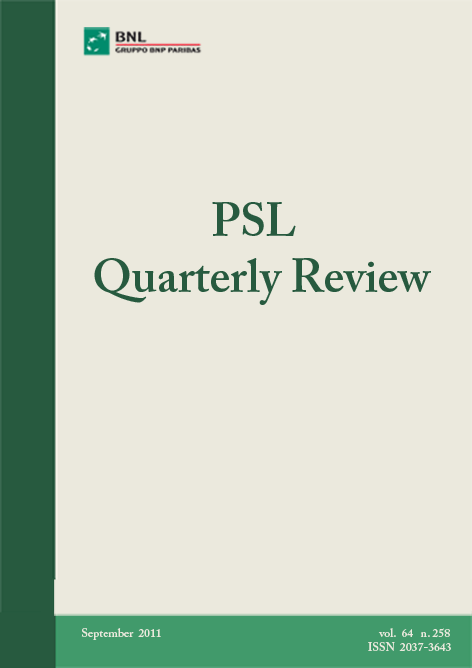Financial governance and economic development: making sense of the Chinese experience
DOI:
https://doi.org/10.13133/2037-3643/9412Keywords:
Chinese banks, market reforms, economic developmentAbstract
Despite fundamental market reforms, the Chinese financial system has remained a mixed system. From the perspectives of the mainstream doctrines of financial liberalization, this system is easily judged to be entailing serious allocative inefficiencies. Nevertheless, from alternative theoretical perspectives, the system might have been conducive to promoting productive efficiency. This paper argues that the actual experience does seem to indicate that, hitherto, the gains in productive efficiency have more than compensated for the losses in allocative efficiency. This judgement helps to make sense of the Chinese anomaly that a seemingly inefficient financial system has co-existed with the outstanding performance of financial deepening and economic development over the past three decades.
JEL Codes: G21, N65, O16
References
AZIZ J. and DUENWALD C.K. (2002), “Growth-financial intermediation nexus in China”, IMF Working Paper, n. WP/02/194, Washington (DC): International Monetary Fund.
ARESTIS P. (2004), “Washington Consensus and financial liberalization”, Journal of Post Keynesian Economics, vol. 27 n. 2, pp. 251-271.
BOYREAU-DEBRAY G. (2003), “Financial intermediation and growth: Chinese style”, Policy Research Working Paper, n. 3027, Washington (DC): World Bank.
DULLIEN S. (2009), Central banking, financial institutions and credit creation in developing countries, New York: United Nations Conference on Trade and Development.
GARCÍA-HERRERO A., GAVILÁ S. and SANTABÁRBARA D. (2006), “China’s banking reform: an assessment of its evolution and possible impact”, CESifo Economic Studies, vol. 52 n. 2, pp. 304-363.
HERR H. (2010), “Credit expansion and development – a Schumpeterian and Keynesian view of the Chinese miracle”, Intervention: European Journal of Economics and Economic Policies, vol. 7 n. 1, pp. 71-89.
KORNAI J. (1990), The road to a free economy. Shifting from a socialist system: the example of Hungary, New York: W. W. Norton and Company.
KORNAI J., MASKIN E. and ROLAND G. (2003), “Understanding the soft budget constraint”, Journal of Economic Literature, vol. 41 n. 4, pp. 1095-1136.
KREGEL J. and BURLAMAQUI L. (2005), “Banking and the financing of development: a Schumpeterian and Miskyan perspective”, in Dimsky G. and de Paula S. (eds.), Reimagining growth: toward a renewal of the idea of development, London: Zed Books.
LAURENCESON J. and CHAI J.C.H. (2003), Financial reform and economic development in China, Northampton (MA): Edward Elgar.
LAZONICK W. (1991), Business organization and the myth of the market economy, Cambridge: Cambridge University Press.
LO D. and LI G. (2011), “China’s economic growth, 1979-2007: structural-institutional changes and efficiency attributes”, mimeo.
LO D. and ZHANG Y. (2011), “Making sense of China’s economic transformation”, Review of Radical Political Economics, vol. 43 n. 1, pp. 33-55.
PALLEY T.I. (2010), “The limits of Minsky’s financial instability hypothesis as an explanation of the crisis”, Monthly Review, vol. 61 n. 11.
PORTES R. (1989), “The theory and measurement of macroeconomic disequilibrium in centrally planned economies”, in Davis C. and Charemza W. (eds.), Models of disequilibrium and shortage in centrally planned economies, London: Chapman and Hall.
YANG D. (2006), “The marketization of Chinese banking and the trade-off between the efficiency of resources allocation and money creation”, paper presented at the international conference on China, East Asia, and Late Development, Beijing, 1-2 September 2006.
YANG H. (1996), “Control or de-control? Theoretical arguments for policy making in transition”, International Review of Applied Economics, vol. 10 n. 2, pp. 209-233.
Downloads
Published
How to Cite
Issue
Section
License



